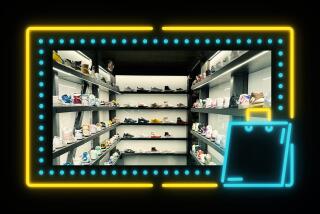Retailers Step Up Recruiting, Add Incentives to Lure Help
- Share via
GLENDALE — When it comes to his 16-year-old daughter, Jose Padilla would rather she focus on school than take a part-time job at a department store.
“We’re in a position where we can offer her money without her having to go out and earn it,” said Padilla, 40, of Simi Valley, as he and his family ate in the Glendale Galleria’s food court. “Priority is school.”
And that’s the problem--for retailers, at least.
With the booming economy, shopkeepers are hard-pressed to find teenage employees. Parents are earning enough cash to provide spending money, car insurance, entertainment and other extras for their children.
And many prefer to have their kids concentrating on homework and extracurricular activities rather than peddling a blouse or ringing up a costume jewelry sale.
To counter this trend, retailers are fighting back with aggressive recruitment tactics--scouring college campuses, advertising anyplace they can and offering bigger employee discounts.
Some are hosting fashion shows, scheduling flexible hours and handing out bonuses to workers who bring friends on board. The incentives include pizza parties, free movie tickets, compact discs and bowling excursions.
They’re also bumping up pay. In the last four years, the average hourly wage for a retail job has risen to $9 from $8. Minimum wage is $5.75 an hour.
“They are target-marketing,” said Patrice Selleck, a spokeswoman for International Council of Shopping Centers, a New York-based trade group. “Unemployment levels are so low right now that retailers and companies are trying to find new ways to get employees in the door. They are using the markets that attract the teens they want working in the store.”
While retailers are increasingly hiring older workers, industry experts say they still prize the younger employees.
Economics are part of the reason. Teens are expected to spend $22 billion this year on fashion alone. From a sales and marketing standpoint, the best people to sell those products are--who else?--teens.
Many managers also like the enthusiasm a young person can bring. Some find teens easier to train than adults who are set in their ways. Stores also like to have different age groups represented on the sales floor to help assess the needs of customers.
“It’s a natural fit for retailers to hire teens because they typically don’t want to work full time and they don’t have the skills to work in the real business world,” said Pamela Rucker, a spokeswoman for the National Retail Federation, a trade organization in Washington, D.C. “They have vacation time. They need the money--or let’s put it this way, they need to earn the money.”
*
So how do stores find young employees?
Tony Vazquez, manager of The Limited Too at Westfield Shoppingtown Topanga in Canoga Park, walks the mall scouting outgoing teens who fit his store’s image. He stops by other stores and asks good customer service providers if they’d be interested in another part-time job.
He also offers incentives to keep his existing staff: free lunch or movie tickets to any employee who can get a friend hired.
Vazquez’s sister store in the Northridge Fashion Center recently started treating employees to dinner or bowling after work a couple times a month. So far, it has worked. In the last two months, the store has lost only three of its 16 employees.
“We make it fun at work. If they aren’t having fun, they are not going to like the job. They’ll take off,” said Nelly Pelayo, manager of The Limited Too at Northridge.
The Eddie Bauer store in the Northridge mall posts signs in its windows: “Why aren’t you working here?” Management also participates in fashion shows at Cal State Northridge, where managers market their wares and look for new recruits.
Kellee Mendoza, manager of the Eddie Bauer store, said getting teen workers is worth the extra trouble.
“They bring a certain freshness to the store. Energy. Mold-a-bility--if that’s the right word,” she said. “A lot of times if it’s their first job, they’re easier to train. They’re not set in their ways.”
For some, of course, getting a job is not a hard sell. Greg Furnish, 19, of La Crescenta said he started work when he was 13 to pay for a car, CDs, a computer and other items his parents couldn’t afford to give him.
“It put value on money and gave me more of an appreciation for what I had,” said Furnish, who works at both the Rose Bowl and a sports shop. “I think kids should have jobs instead of getting stuff they want all the time,” he said.
But Alexis Fragosa, shopping with Furnish at the Glendale Galleria recently, said she quit a retail job in high school because her school work was suffering.
*
Fragosa, 19, said teens can learn the same kinds of responsibilities by getting good grades, writing for the school newspaper and getting involved in student government.
“When you work, you’re taking away from your school,” she said. “It only makes sense that if you’re in school, you should give it your all. That’s what you’re there for.”
More to Read
Inside the business of entertainment
The Wide Shot brings you news, analysis and insights on everything from streaming wars to production — and what it all means for the future.
You may occasionally receive promotional content from the Los Angeles Times.










